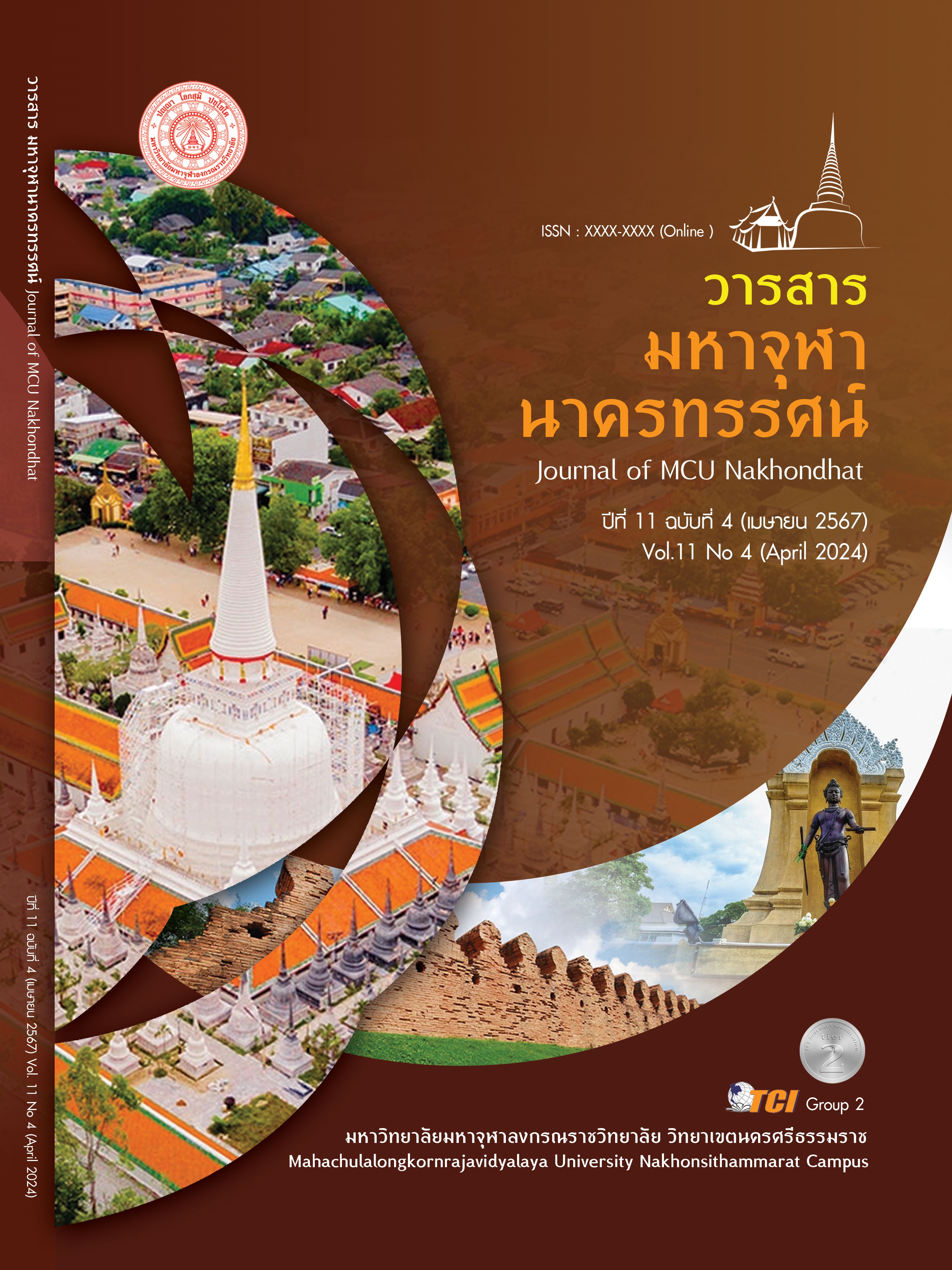SCHOOL ADAPTATION AND LEARNING MANAGEMENT STRATEGIES POST - COVID - 19: A CASE STUDY OF A PRIVATE ELEMENTARY SCHOOL IN NARATHIWAT PROVINCE, THAILAND
Main Article Content
Abstract
The objective of this research is to investigate the school adaptation and learning management strategies post covid - 19: Case study of a private elementary school in Narathiwat province, Thailand. The study utilizes a qualitative research approach, collecting data through in-depth interviews with key informants from four groups, totaling 21 individuals. These groups include 1) parents (6 individuals), 2) students (6 individuals, selected from Grade 6), 3) teaching staff (6 individuals with at least 2 years of teaching experience within the school), and 4) school administrators (3 individuals directly involved in school management with at least 2 years of experience in educational administration). Data analysis employs content analysis, presenting findings in a narrative analysis report. The research reveals that school adaptation involves three dimensions. 1) School Management Adaptation: This includes three interconnected components: personnel management, budget management, and technology management. 2) Learning Management Post - COVID - 19: Flexible and contemporary learning management strategies are necessary post-pandemic to adapt effectively. 3) Development of Learning Environment: Creating a supportive learning environment is crucial for fostering academic and physical development among students. Three important learning management strategies include.
1) Integration of Technology: Integrating technology to make education more flexible and responsive to changing societal contexts. 2) Development of Digital Skills: Digital skills are crucial and require training and knowledge transfer to teaching staff, enabling them to utilize innovative teaching tools effectively. 3) Collaborative Curriculum Design: Involving schools, teachers, students, parents, and the community in the selection and design of learning content.
Article Details

This work is licensed under a Creative Commons Attribution-NonCommercial-NoDerivatives 4.0 International License.
References
กรมประชาสัมพันธ์. (2564). กระทรวงศึกษาธิการกำหนด 5 รูปแบบการเรียนการสอนรองรับการเปิดภาคเรียนให้เหมาะสมแต่ละภูมิภาคของประเทศ. เรียกใช้เมื่อ 16 ธันวาคม 2566 จาก https://www.prd.go.th /th/content/category/detail/id/9/iid/19133
กระทรวงสาธารณสุข. (2562). คำแนะนําและมาตรการในการป้องกันควบคุมโรคไข้หวัดใหญ่สำหรับโรงเรียนและสถานศึกษา. เรียกใช้เมื่อ 16 ธันวาคม 2566 จาก https://ddc. moph.go.th/o dpc7/news.php? news=11064&deptcode=
เตชินี ทิมเจริญ และชรินทร์ มั่งคั่ง. (2565). การจัดการเรียนรู้โดยใช้การเรียนรู้แบบร่วมมือเพื่อส่งเสริมทักษะการทำงานเป็นทีมสาระการเรียนรู้สังคมศึกษาศาสนาและวัฒนธรรมสำหรับนักเรียนมัธยมศึกษาตอนต้น. วารสารการวิจัยกาสะลองคำ, 16(1), 97-107.
ธีร์ ภวังคนันท์. (2564). การบริหารการศึกษาในสถานการณ์การระบาดของโรคโควิด-19 ในยุคฐานวิถีชีวิตใหม่. วารสารบวรสหการศึกษาและมนุษยสังคมศาสตร์, 2(2), 25-32.
ภริมา วินิธาสถิตกุล และชนินันท์ แย้มขวัญยืน. (2565). การเรียนรู้เชิงรุก: แนวทางการเรียนการสอนที่เป็นเลิศในศตวรรษที่ 21: มหาวิทยาลัยสวนดุสิต. วารสารนวัตกรรมการศึกษาและการวิจัย, 6(3), 922-933.
มัณฑนา ศรีพุทธา. (2564). ชุมชนการเรียนรู้ทางวิชาชีพที่ส่งผลต่อทักษะของผู้เรียนในศตวรรษที่ 21. จันทบุรี: มหาวิทยาลัยราชภัฏรำไพพรรณี.
โรจกร ลือมงคล. (2565). ความเครียดในการเรียนออนไลน์ ช่วงการระบาดของโรคโควิด - 19 :กรณีศึกษาในนักเรียนมัธยมศึกษาของโรงเรียนคอนสวรรค์ อำเภอคอนสวรรค์ จังหวัดชัยภูมิ. วารสารศูนย์อนามัยที่ 9, 16(3), 772-783.
ศราวุฒิ ขันคำหมื่น และรัตนา กาญจนพันธุ์. (2566). คุณลักษณะอันพึงประสงค์ของผู้บริหารสถานศึกษาประเทศไทย 4.0 สังกัดสำนักงานเขตพื้นที่การศึกษามัธยมศึกษาบุรีรัมย์. วารสารวิจัยและพัฒนา มหาวิทยาลัยราชภัฏบุรีรัมย์, 18(1), 57-71.
ศรีสุดา ไชยวิจารณ์ และคณะ. (2558). การจัดสภาพแวดล้อมที่เอื้อต่อการเรียนรู้ด้วยตนเองของนักศึกษาในมหาวิทยาลัยราชภัฏนครศรีธรรมราช. วารสารนาคบุตรปริทรรศน์, 10(1), 60-72.
ศุภวรรณ การุญญะวีร์. (2564). การเรียนการสอนสำหรับนักเรียนในสถานการณ์การระบาดของโรคโควิด - 19. วารสารบวรสหการศึกษาและมนุษยสังคมศาสตร์, 2(2), 48-55.
สมพร รุ่งเรืองกลกิจ และคณะ. (2562). การเรียนรู้ผ่านประสบการณ์: พื้นที่ปลอดภัยในการเรียนรู้. วารสารมนุษยศาสตร์และสังคมศาสตร์ มหาวิทยาลัยอุบลราชธานี, 12(1), 89-110.
Chelong, A. (2022). Future studies and the development of student activities in Thai higher education post – COVID - 19 pandemic. Journal of Organizational Innovation & Culture, 12(2), 7-17.
Colaizzi, P. (1978). Psychological Research as the Phenomenologist views it. In Existential - Phenomenological Alternatives for Psychology (Valle R. & King M. eds). New York: Oxford University Press.
George, A. L. & Bennett, A. (2005). Case Studies and Theory Development in the Social Science. Cambridge, MA: MIT Press.
Reid, A. J. (1996). What we want: Qualitative research. Canadian Family Physician, 42(1), 387-400.
WHO. (2024). COVID - 19 dashboard “Number of COVID-19 cases reported. Retrieved December 8 , 2023, from https://data.who.int/dashboards/covid19/cases?n=c


